Empire of Pain
audiobook (Unabridged) ∣ The Secret History of the Sackler Dynasty
By Patrick Radden Keefe

Sign up to save your library
With an OverDrive account, you can save your favorite libraries for at-a-glance information about availability. Find out more about OverDrive accounts.
Find this title in Libby, the library reading app by OverDrive.



Search for a digital library with this title
Title found at these libraries:
| Loading... |
The gripping and shocking story of three generations of the Sackler family and their roles in the stories of Valium, OxyContin and the opioid crisis. The inspiration behind the Netflix series Painkiller, starring Uzo Aduba and Matthew Broderick. Read by the author, Patrick Radden Keefe.
Winner of the Baillie Gifford Prize for Non-Fiction
A BBC Radio 4 'Book of the Week'
Shortlisted for the Financial Times/McKinsey Business Book of the Year Award
Shortlisted for the Crime Writers' Association Gold Dagger for Non-Fiction
One of Barack Obama's Favorite Books
The Sackler name adorns the walls of many storied institutions – Harvard; the Metropolitan Museum of Art; Oxford; the Louvre. They are one of the richest families in the world, known for their lavish donations in the arts and the sciences. The source of the family fortune was vague, however, until it emerged that the Sacklers were responsible for making and marketing Oxycontin, a blockbuster painkiller that was a catalyst for the opioid crisis – an international epidemic of drug addiction which has killed nearly half a million people.
In this masterpiece of narrative reporting and writing, award-winning journalist and host of the Wind of Change podcast Patrick Radden Keefe exhaustively documents the jaw-dropping and ferociously compelling reality. Empire of Pain is the story of a dynasty: a parable of twenty-first-century greed.
'You feel almost guilty for enjoying it so much' – The Times






